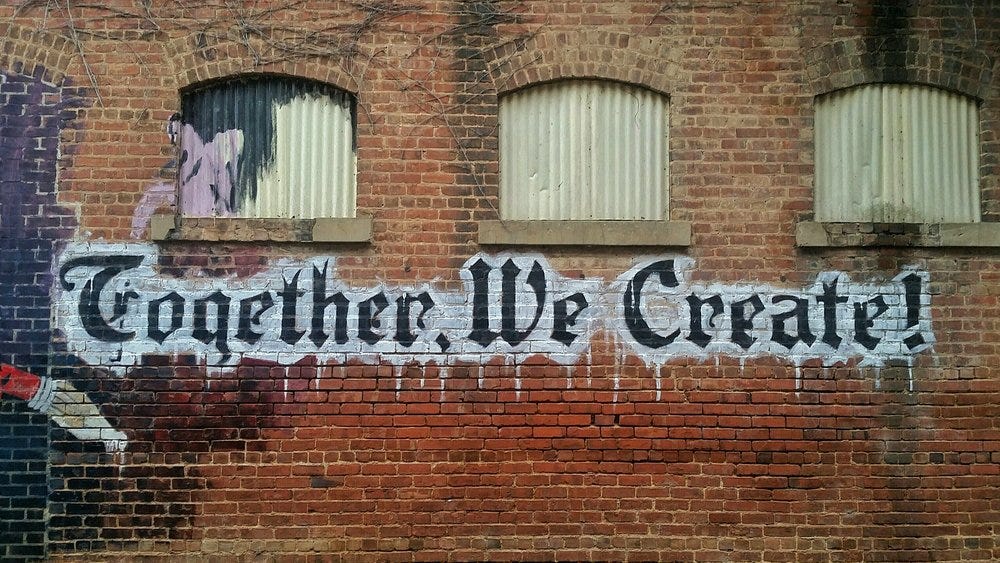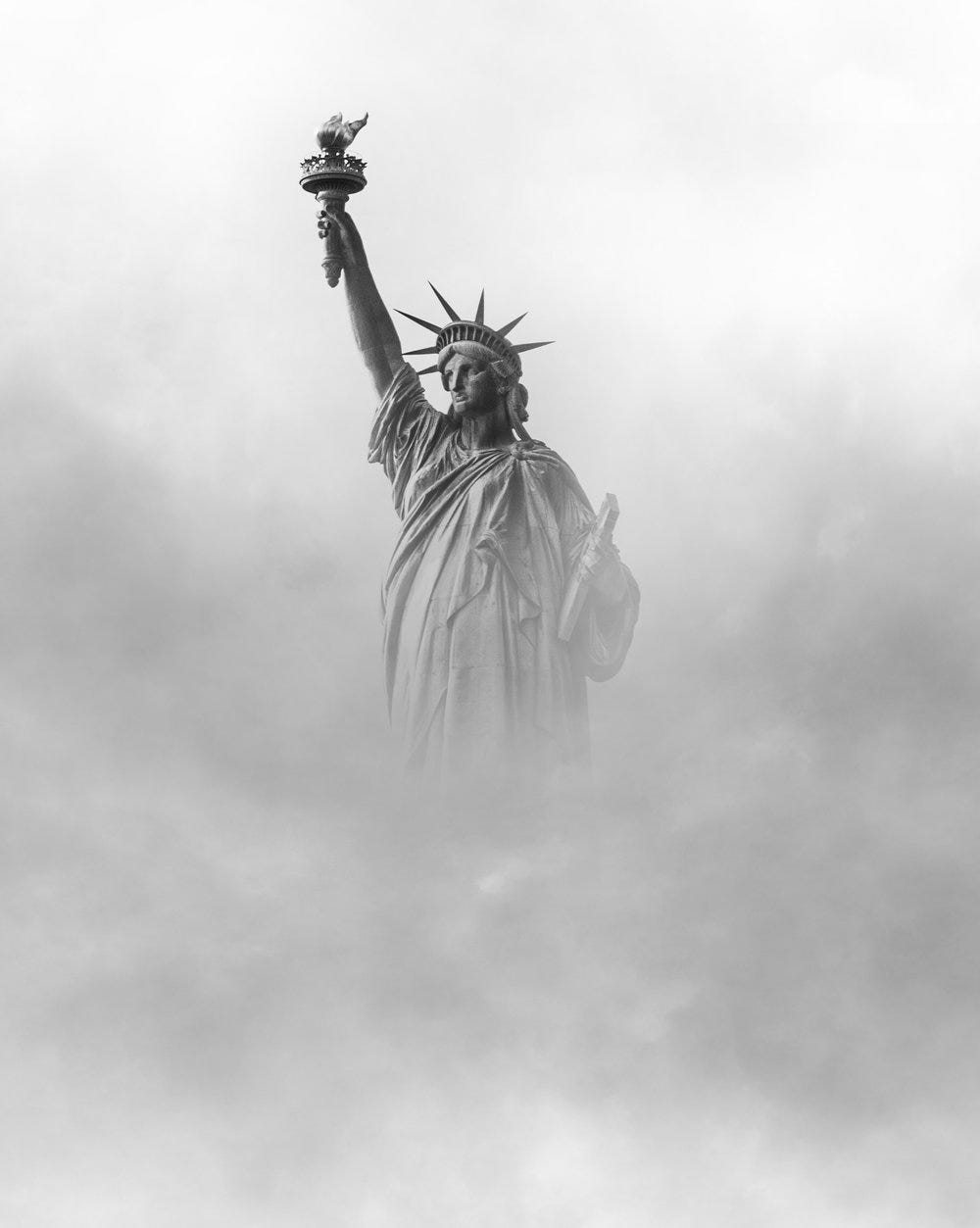The Dangers of Division and the Challenge of Cooperation
All conflict boils down to a question of self and other. Conflict is about getting stuck in the false dichotomy of choosing between self-expression and self-protection or connecting with and gaining the mutual support of others. To paraphrase the theologian Paul Tillich, all living things are motivated by two drives: the drive to express their self more and in more places, and the need to reconnect with the separated. These are not either/or choices. There is space in the world for them and us because we are all us. We must learn to work together, or the very idea that we need to choose our self or our team at the expense of others will literally kill us.

Division, separation and polarization will kill us by making us collectively ineffective in facing the complex and significant challenges in life. Division will destroy us by undermining our ability to claim and enact shared values. Separation will kill us by driving more and more people into the dark well of loneliness that is the precursor to suicide. We either can learn to embrace the complexity of life, do the difficult work of finding our common cause, or we can choose to die alone collectively.
A brief anecdote: During my freshman year of college, I was on a school trip to a wintery and windy place. About 20–30 of us were waiting in the cold for our next tour to begin. Two or three couples were in mutually warming embraces. The rest of us, all single apparently, were freezing our patooshkies off. I came up with the idea of hug treaties. I asked my fellow students if they would join me in platonic hugs to keep each other warm. They met me with hesitation at first; then, consensually, I found a friend to hold for mutual protection from the cold. Some others followed suit. Nonetheless, most people chose to remain cold and alone rather than risk the intimacy required to be in a warm embrace.
To me, the current state of polarized politics looks a lot like two people trapped in a blizzard choosing to freeze to death alone, afraid to share each other’s warmth. In the world today, we seem to be more willing to die separately than we are ready to trust that we could find a common cause with others around us. In the US and many other countries, people seem more prepared to dig into their partisan perspectives than to find ways to address the everyday needs arising from having a shared history and future with their fellow citizens. Internationally, there is a rising tendency towards isolation across cultures and religions, even as our global interdependence grows.
In my observation, there is a trend towards division: the political left and right emphasize their incompatibility and define their success by the failure of others. I also see a trend towards separation, which arises from the mundane day-to-day erosion of essential human interaction. There is plenty of documentation about how schools, neighborhoods, cities, and Facebook feeds are becoming more segregated. There are fewer opportunities to interact with people of diverse perspectives and life experiences. That is a structural change, and it is our choice.
The hard work of finding ways to bring us together is something we have to struggle for generations. Our survival depends on it. As my friend and colleague Kenneth Cloke says, “If the boat is sinking, it doesn’t matter what side of it you’re on.”
Division and polarization are popular and ineffective
It is entirely natural to seek the comfort of familiarity and predictability from connecting with our tribe. It is natural for us to distrust unfamiliar people who have interests that seem divergent from our own. It is in our human nature. In his book The Suicide of the West, Jonah Goldberg elegantly lays out how modern society (since The Enlightenment and definitely since World War II) is an elaborate system designed to help us overcome our natural tendencies to divide and only care for our tribe or group. The Enlightenment technologies of democracy, nation-states and liberal capitalism are tools designed to get us to work together with people who we otherwise would not want to interact with. Society can quickly unravel into mass violence without these man-made and unnatural tools to hold us together. The 20th century is full of examples of the times when choosing to favor one group at the expense of another led to the loss of millions of lives.
A second reason it is tempting to cultivate division across political, ideological and cultural lines is that it is powerfully mobilizing. Separating the world into “us and them" affirms our sense of rightness and our identity. It is always popular to hear that the way that you see things is the "right" way, and it quickly follows to say that others must see things the "wrong" way. When we organize the world into right and wrong, it becomes much easier to make posters, slogans, talking points, and soundbites with clear messages.
It seems logical to be fixed and divided in our world views because we are increasingly exposed to different information and stories. The mainstream media (where serious journalism is a dying industry) is learning that it can spike ratings by being more polarizing, but this is coming at the cost of journalistic integrity. That further feeds the trend of polarization by dividing the information that people are exposed to. How many people who are against Trump have ever seen him speak? How many people who are angry about people kneeling for the national anthem have talked to a black family about their experience with policing in their community?
Dividing and polarizing are natural, have short-term advantages, and seem to make sense based on our information, but it is profoundly ineffective in the long term. Ideas born out of polarization don't work for many reasons. Firstly, choices and decisions that are made by a single homogenous paradigm will be too simple. Multiple and diverse perspectives allow for a clearer understanding of a situation. Secondly, any single idea taken to an extreme (without checks and balances) will tend towards destruction and degeneration. Thirdly, if the people involved in a conflict are in an ongoing relationship, then any solution where someone wins or loses will be unsustainable. Processes and outcomes based on winners and losers will corrode the entire system with resentment and resistance.
Life is complex, and the problems we need to face these days require an understanding of nuance. Whether the goal is to manage the oceans, address climate change, transform racial politics, or keep an effective economy going, we need everyone involved in the problems to contribute to the solutions actively.
What's possible when we embrace our common cause
We have to recognize that we are all in this together. We are bound up with our families, fellow citizens, fellow humans, and even our enemies. There is no way around this fact, no matter how hard it is to imagine. The upside of this truth is more perspectives open the door to better and more precise solutions to our problems. Sure, it is more complicated and takes more time to engage with ideas that initially seem incompatible, but that is a small price to pay.
By engaging with diverse groups whose fates are bound up together, we can find more durable, more inclusive, and more agile ways of living. Including everyone forces us to engage with a situation's nuances and anticipate life's inevitable contingencies. The issues that the United States and the world face are incredibly complex and cannot be addressed with simple and fixed solutions. We need nuanced and complex conversations. Wherever there is polarization, the poles tend to have the antidotes for each other's shadows. The opposition and resistance to any cause are usually armed with critiques that the other side needs to hear.
Fortunately, both sides are usually eager to offer their criticisms to the other side. If one can hear and integrate the wisdom held by the other side, they will strengthen their perspective. Neither politics nor life are zero-sum games. This means that one doesn't lose out when they acknowledge the validity of the other's experience, and one can't say another is wrong simply because they believe they're right. Conversely, the incorporation of more perspectives contributes to an ever-clearer vision of a problem.
Another advantage of taking a pluralistic approach to a problem is that it can compel the participants to look beyond the surface issues and find the actual source of a conflict. When people find the heart of a persistent conflict, they can then redesign the foundations that create the conflict and prevent the repetition of chronic problems. As people work together to address the core issues behind a challenging situation, they become active participants in ensuring the success of the outcomes.
Furthermore, as people recognize their responsibility for supporting the shared cause, they can then lift the value of their relationships and authentic connections once again. As people embrace the legitimacy of their shared humanity, the collective energy naturally shifts towards peaceful, sustainable and dynamic experiences that everyone wants to be part of. Including diverse voices forces everyone to lay aside what they want their desired outcome to be and focus on how they want to do it.
How to transcend polarization and division without losing yourself
Your voice is important. Any system must meet your interests and needs for it to be successful. And it is also necessary to address the needs and interests of others. Even when it seems impossible for everyone to get the outcome they want, we still need your voice in the game. We need the voice of every stakeholder to participate in the change. To accomplish this paradoxical feat, you may need to reassess what you think you want. You may need new skills, you may need to reassess who you are, and you might need to rethink the entire question that you want to answer.
To get what you want, you need to understand what you really want. Every position, solution or idea is a tool for meeting a deeper need. It is worth asking yourself, "why do I want what I want?" "What needs of mine are not getting met in the status quo?" This is a deep question, but it is worth digging into. Positions are solutions that are born out of isolation and fortified. If, on the other hand, you can turn your attention toward expressing your underlying interests in a situation (not your strategy for meeting them), you will be able to focus on the universal themes that everyone can empathize with.
There is a good piece of advice that's relevant here. Some are more predisposed towards empathy, while others tend to be more assertive. Both are important, so whichever you are most inclined towards, learn how to do that first. Don't fight yourself. But once you are good at caring for others or asserting yourself, learn the other skill. The most influential people are the ones that can recognize and forge an interdependent connection between their own needs and the needs of others.
It can also be helpful to rethink who you are. Everything in life is a holon. Holons are whole/parts. That means that everything is a whole made up of smaller parts, and everything is a part of a larger whole. If you can't figure out how to meet your needs as an individual, look to see what shifts if you focus on your needs as part of a team, a nation, or the whole human race. What happens if you focus on your role as a biological conglomeration of organs and cells? There are many ways to rethink who you are, and there are versions of your identity that include your perceived enemies. In almost any conflict, there is a way to rethink what's going on by abandoning the idea of being an "us vs. them" and looking towards how everyone involved is part of a "we," a team trying to address a shared problem collectively.
An excellent strategy for accomplishing this is to find the right question. The right question is one that everyone involved is eager to answer. To do this, let go of "either/or" questions that lead to yes and no answers. Instead, consider questions that ask how there can be space for "Both/And" approaches. Or even better, consider asking what the solutions could be if neither solution is valid. These questions and the answers they produce are inherently dynamic and ever-changing. Often they lead to solutions that embrace the interdependence of the various perspectives. Both/And thinking leads to situations that look more like breathing. Every inhale is balanced by an exhale, which creates space for the next inhale.
This kind of work requires determination & flexibility, experimentation & patience. We can do this so much better.


